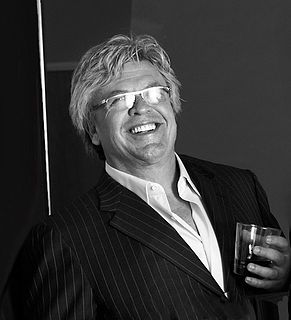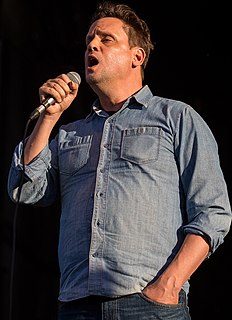A Quote by John Irving
It doesn't really matter who said it - it's so obviously true. Before you can write anything, you have to notice something.
Related Quotes
I really, really enjoy fitting words together - but I only enjoy it when it's easy, when it sort of rolls along by itself. I never erase anything [and] I hardly ever write anything down... The song will be finished before I write it down... I won't write a song unless it serves me in some way, unless I feel I have to write the song to make myself feel better. If you're not overflowing with something, there's nothing to give.
You have to resign yourself to the fact that you waste a lot of trees before you write anything you really like, and that's just the way it is. It's like learning an instrument, you've got to be prepared for hitting wrong notes occasionally, or quite a lot, cause I wrote an awful lot before I wrote anything I was really happy with. And read a lot. Reading really helps. Read anything you can get your hands on.
Obviously, Mitro and I both wanted the number 9 shirt, so the manager said that a shooting competition was the easiest way to decide it. But then, before we went out to training, Mitro just said 'here, Dwight, you have it'. That was it, really. It was a really nice gesture - very mature of him - and it was a sign of togetherness.
When I was young I was depressed all the time. But suicide no longer seemed a possibility in my life. At my age there was very little left to kill. It was good to be old, no matter what they said. It was reasonable that a man had to be at least 50 years old before he could write with anything like clarity.
And then afterwards I worked in advertising for a year which taught me about writing even when you don't want to (laughter) because there's never a moment that you want to write about an Erickson cell phone but you have to. And that's really important you know obviously for the...like if you really want to write, you have to write every day no matter how you feel or you know. And then, yeah, and then I ended up working in TV and then from TV into movies and then directing, so.
I think the point of cinematography, of what we do, is intimacy. Is intent, is the balance between the familiar and the dream, it is being subjective and objective, it is being engaged and yet standing back and noticing something that perhaps other people didn’t notice before, or celebrating something that you feel is beautiful or valid, or true or engaging in some way.
Philip Larkin didn't write for several years before his life ended. And when he was asked why he didn't write, he said the muse deserted him. And when I read that, it really had a profound effect upon me, sort of scared me. So that's why I think I have no right to assume that some thought is going to come... But I think, in my imagination, if it is it, there will probably be something else I'm interested in.





































